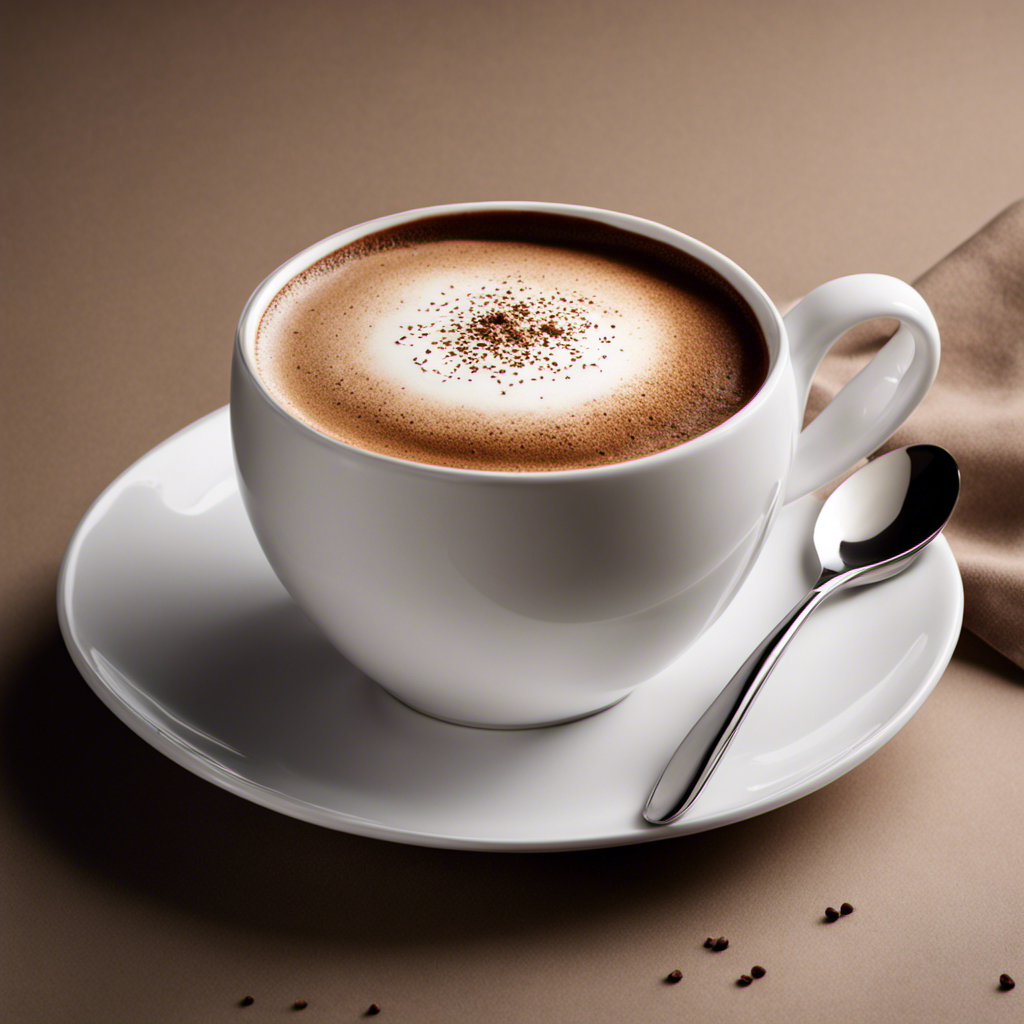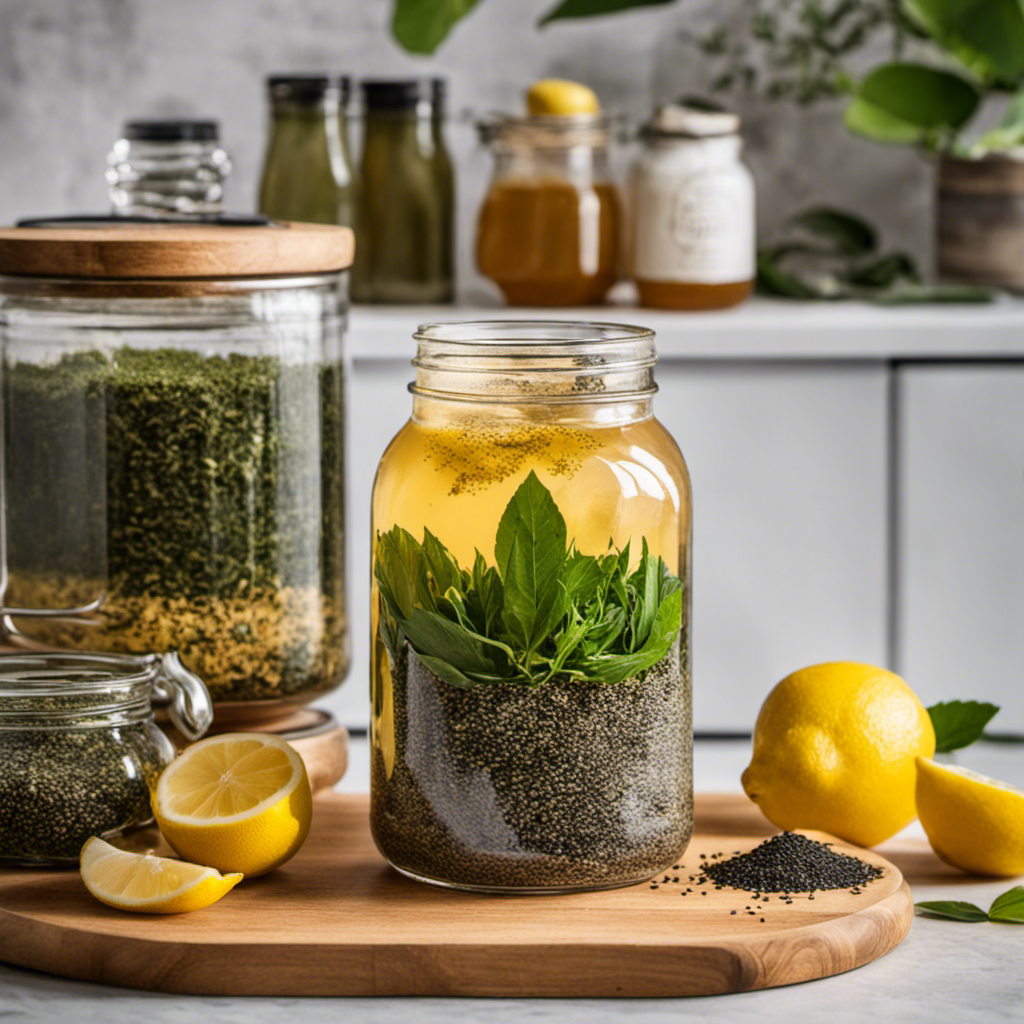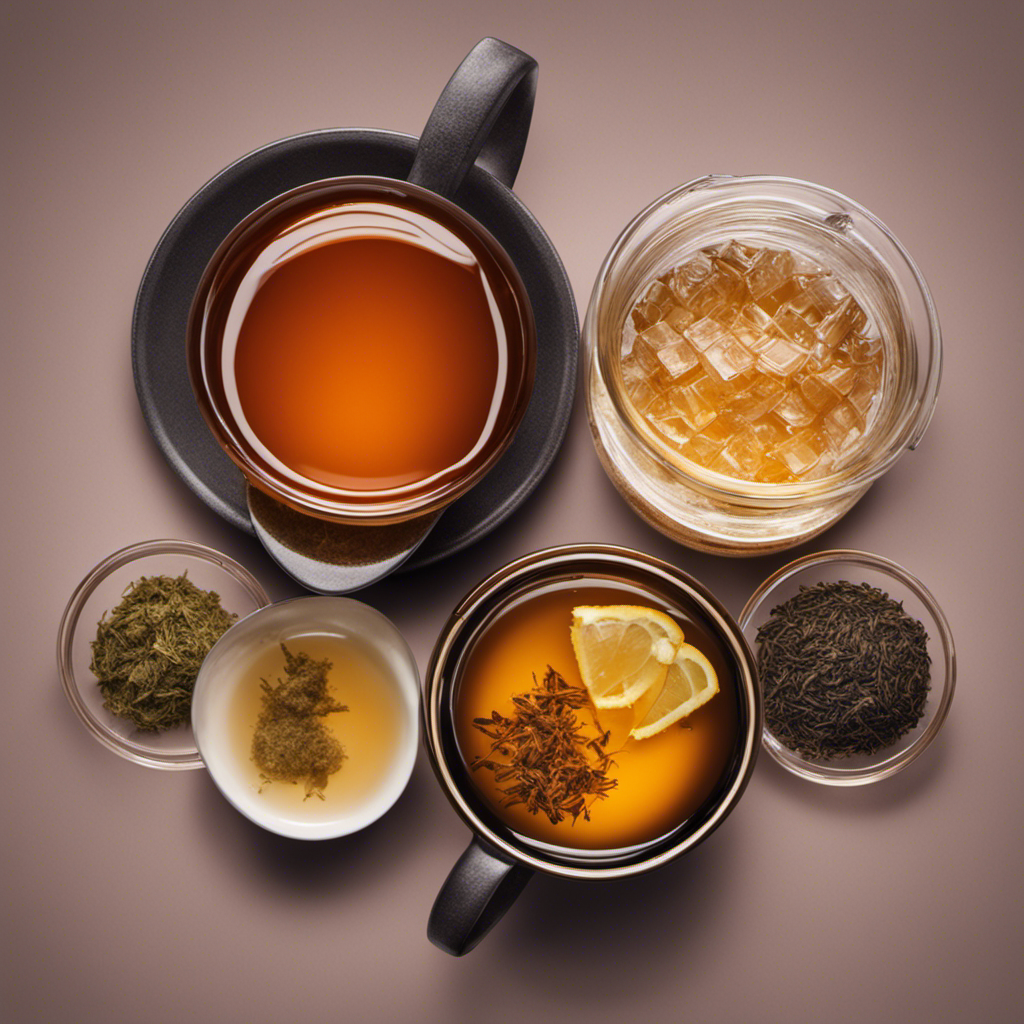Cappuccino
Can a Cappuccino Keep You Awake

As a coffee lover, I often find myself turning to a cappuccino for that much-needed boost of energy. But can a cappuccino really keep me awake? Let’s dive into the science behind caffeine’s alertness-boosting effects and discover how cappuccinos compare to other caffeinated beverages.
We’ll explore the impact of cappuccino on sleep quality and uncover the optimal timing for consuming this delightful beverage. And for those sensitive to caffeine, fear not, we’ll also explore some delicious cappuccino alternatives.
Get ready to sip and stay awake!
Key Takeaways
- Caffeine in cappuccinos acts as a competitive antagonist, blocking adenosine receptors and increasing alertness.
- Cappuccinos offer a smooth and creamy texture and a flavorful complexity beyond just a caffeine boost.
- Consuming cappuccinos before bed can disrupt sleep quality and lead to chronic sleep deprivation.
- Timing cappuccino consumption based on personal caffeine sensitivity and sleep schedule is key for optimal wakefulness.
The Science Behind Caffeine’s Alertness Boost
I can feel my energy levels rising after drinking a cup of coffee due to the science behind caffeine’s alertness boost. Caffeine metabolism is a fascinating process that occurs in our bodies. When we consume caffeine, it’s quickly absorbed into our bloodstream and distributed throughout our body.
Once in our brain, caffeine acts as a competitive antagonist, binding to adenosine receptors. Adenosine is a neurotransmitter that promotes sleep and relaxation. By blocking these receptors, caffeine prevents adenosine from binding, leading to increased alertness and reduced drowsiness.
This mechanism also triggers the release of other neurotransmitters such as dopamine and norepinephrine, which further enhance our mood and cognitive function. It’s incredible how a simple cup of coffee can have such a profound impact on our mental state and productivity.
How Cappuccinos Compare to Other Caffeinated Beverages
Cappuccinos’ unique balance of espresso, steamed milk, and froth sets them apart from other caffeinated beverages. As a coffee lover, I’ve always been intrigued by how cappuccinos compare to energy drinks and black coffee. Here are four reasons why cappuccinos stand out:
-
Smooth and Creamy: Unlike energy drinks, cappuccinos offer a velvety texture and a rich, indulgent taste. They provide a satisfying experience that goes beyond just a caffeine boost.
-
Moderate Caffeine Content: Cappuccinos typically contain less caffeine than energy drinks, making them a better choice if you want a milder wake-up call. They offer a balanced dose of energy without the jitters.
-
Flavorful Complexity: While black coffee may have a strong, bold flavor, cappuccinos bring a whole new level of complexity. The combination of espresso, steamed milk, and froth creates a harmonious blend of flavors that appeals to the senses.
-
Versatile Options: Cappuccinos can be customized to match your preferences. Whether you prefer a traditional cappuccino with equal parts espresso, steamed milk, and froth, or you like to experiment with different flavors and toppings, there’s a cappuccino for everyone.
The Effects of Cappuccino on Sleep Quality
Drinking cappuccinos before bed can disrupt sleep quality due to the combination of caffeine and high-fat content. Caffeine is a stimulant that can interfere with the body’s natural sleep-wake cycle, making it difficult to fall asleep and stay asleep.
While some individuals may have a higher caffeine tolerance and can consume cappuccinos without experiencing significant sleep disturbances, for others, it can have long-term effects on their sleep patterns. Regular consumption of caffeine close to bedtime can lead to chronic sleep deprivation, which can have negative consequences on overall health and well-being.
It’s important to be mindful of our caffeine intake, especially in the evening, and consider opting for decaffeinated alternatives or limiting our consumption of cappuccinos before bed to ensure a good night’s sleep.
Timing Is Key: When to Drink a Cappuccino for Optimal Wakefulness
By sipping a cappuccino in the morning and avoiding it in the late afternoon, I can ensure optimal wakefulness throughout the day. The timing of cappuccino consumption plays a crucial role in its effectiveness. Here are four factors that affect how long a cappuccino keeps you awake:
-
Caffeine tolerance: Different individuals have varying levels of sensitivity to caffeine. Some may experience prolonged wakefulness, while others may feel the effects wear off quickly.
-
Caffeine metabolism: The rate at which our bodies metabolize caffeine differs from person to person. Understanding your personal caffeine metabolism can help determine the ideal timing for cappuccino consumption.
-
Sleep schedule: Drinking a cappuccino too close to bedtime can disrupt your sleep cycle, making it harder to fall asleep and impacting the quality of your rest.
-
Other stimulants: Consuming other caffeinated beverages or substances alongside a cappuccino can amplify its effects and extend its wakefulness-inducing properties.
Cappuccino Alternatives for Those Sensitive to Caffeine
Since I’m sensitive to caffeine, I often opt for decaf cappuccino alternatives to still enjoy the rich taste without the jitters. Caffeine can have a stimulating effect on the nervous system, causing increased heart rate and alertness. However, for individuals like myself who are sensitive to its effects, it can lead to restlessness, anxiety, and even insomnia.
Thankfully, there are plenty of cappuccino alternatives available for us caffeine-sensitive individuals. One option is to substitute regular coffee with decaf coffee, which still provides the familiar taste of cappuccino without the caffeine content.
Another alternative is to try herbal or fruit-infused teas, which offer a diverse range of flavors and can be enjoyed as a warm beverage.
Additionally, there are also non-dairy milk alternatives such as almond, soy, or oat milk that can be used to create a creamy and satisfying cappuccino-like drink.
Frequently Asked Questions
How Many Calories Are in a Cappuccino?
A cappuccino typically contains around 120 calories. However, it’s important to note that the main focus of the question is on the caffeine content and its effects on wakefulness, rather than the calorie count.
Does the Size of the Cappuccino Affect Its Caffeine Content?
The size of a cappuccino does affect its caffeine content. Larger cappuccinos generally have more caffeine because they contain more espresso shots. So, if you’re looking for a wake-up boost, go for a bigger size!
Can a Cappuccino Cause Dehydration?
As a coffee lover, I can confidently say that cappuccinos don’t cause dehydration. However, it’s important to note that their caffeine content can keep you awake. So enjoy your cappuccino, but stay hydrated too!
Are There Any Health Benefits to Drinking Cappuccino?
Cappuccino contains essential nutrients like calcium and vitamin D, which contribute to bone health. Additionally, the caffeine in cappuccino can improve alertness and focus, making it a great choice for staying awake during the day.
Does the Type of Milk Used in a Cappuccino Affect Its Effects on Wakefulness?
As a coffee lover, I’ve found that the type of milk used in a cappuccino does impact its effects on wakefulness. For example, non-dairy milk alternatives can reduce the impact of lactose intolerance and still keep you awake.
Conclusion
Drinking a cappuccino is like having a jolt of electricity coursing through your veins. Its potent dose of caffeine can keep you wide-eyed and alert, making it the perfect pick-me-up when you need to power through a long day or stay awake during a late-night study session.
So next time you need a boost, grab a cappuccino and let its invigorating powers awaken your senses.
Arf, an author and an innovative enthusiast of coffee, coffee alternatives, and tea, plays a crucial role as a contributor to the esteemed Cappuccino Oracle platform. Renowned for his curiosity and passion for these captivating beverages, Arf has carved out a unique space for himself in the world of exploration and writing. He realized that coffee, coffee alternatives, and tea are not mere drinks to keep one awake, but universes of flavors and stories waiting to be explored.
Arf’s articles for Cappuccino Oracle blend meticulous research with personal experiences, providing readers with an in-depth understanding of various types of coffee, coffee alternatives, and tea, along with their unique characteristics, cultures, and histories. His honest reviews and engaging narratives guide readers on their own journeys, helping them discover their preferences and find their perfect brew.
Cappuccino
Discover the Rich History and Perfect Techniques Behind the Irresistible Cappuccino

I have always thought that a delicious cup of cappuccino has the ability to improve any day. With its bold espresso and creamy steamed milk, it’s a soothing treat that never fails to brighten my mood.
In this article, I’ll share the origins of cappuccino, a traditional recipe, and techniques for perfecting your own cup. Whether you’re a coffee connoisseur or simply enjoy a good brew, get ready to elevate your cappuccino game to new heights.
Key Takeaways
- Cappuccino originated in Italy in the 17th century and was enjoyed by the upper class.
- The name ‘cappuccino’ is believed to have come from the Capuchin friars.
- The traditional recipe consists of equal parts espresso, steamed milk, and milk foam.
- Steaming the milk at the ideal temperature and pouring it slowly creates a creamy and frothy texture.
The Origins of Cappuccino
I love learning about the origins of cappuccino and how it became such a popular coffee drink.
The history of cappuccino dates back to the 17th century in Italy. It’s believed that the name ‘cappuccino’ was derived from the Capuchin friars, who wore brown hoods that resembled the color of the coffee.
Initially, cappuccino was made with equal parts of espresso, steamed milk, and milk foam. It was a drink enjoyed by the upper class and was often served after dinner.
Over time, cappuccino spread across Europe and eventually made its way to America. Today, it has become a staple in coffee shops worldwide, reflecting the influence of Italian culture on coffee consumption around the globe.
The history and culture behind cappuccino make it a fascinating and beloved beverage.
Traditional Cappuccino Recipe
Sometimes, I like to make a traditional cappuccino using the classic recipe of equal parts espresso, steamed milk, and milk foam. This iconic drink has been a staple in coffeehouse culture for decades, known for its perfect balance of flavors and velvety texture. When crafting my cappuccino, I start by pulling a shot of rich espresso, with its bold aroma and intense flavor. Then, I carefully steam the milk to create a creamy and frothy texture. Finally, I pour the milk over the espresso, creating the perfect ratio of coffee to milk. The result is a delightful beverage that combines the strong notes of espresso with the smoothness of steamed milk. It’s no wonder that the classic cappuccino continues to be a favorite among coffee lovers in the vibrant coffeehouse culture.
Espresso Steamed Milk Milk Foam Rich Creamy Frothy
Techniques for Steaming Milk
To achieve the perfect texture, it’s important to carefully steam the milk with the correct technique. Steaming milk is a crucial step in creating a delicious cappuccino or latte.
Here are some common mistakes to avoid and some milk frothing tools to help you achieve that velvety smooth microfoam:
-
Not using fresh, cold milk: Fresh milk produces the best results, so avoid using milk that has been sitting out for too long.
-
Incorrect temperature: The ideal steaming temperature for milk is between 140-160°F. Anything above or below can affect the taste and texture.
-
Improper positioning of the steam wand: Position the steam wand slightly off-center and just below the surface of the milk to create a whirlpool effect.
-
Oversteaming: Oversteaming the milk can result in large bubbles and a thin, frothy texture. Aim for small, uniform bubbles.
-
Using the wrong frothing tools: Invest in a good quality frothing pitcher and thermometer to ensure precision and consistency in your milk steaming process.
Creative Cappuccino Variations
Experimenting with unique flavor combinations and adding a touch of creativity can elevate your cappuccino variations to new levels of deliciousness. When it comes to cappuccinos, the possibilities are endless. From classic vanilla and caramel to more adventurous flavors like lavender and gingerbread, there are plenty of options to suit every taste.
But it’s not just about the flavors; presentation is also key. Cappuccino art has become increasingly popular, with baristas showcasing their skills by creating intricate designs on the foam. Whether it’s a heart, a leaf, or even a cute animal, these little details add an extra touch of beauty to your cup.
Tips for Perfecting Your Cappuccino
I love adding a dash of cinnamon and a sprinkle of cocoa to my cappuccino, it’s the perfect way to enhance the flavor. But there’s more to a perfect cappuccino than just the taste.
Achieving the ideal foam consistency and mastering latte art techniques are essential for a truly exceptional cup of coffee. Here are some tips to help you perfect your cappuccino:
- Use fresh, high-quality espresso beans for the best flavor.
- Froth the milk to achieve a creamy and velvety texture.
- Pour the milk slowly and steadily into the espresso to create a beautiful layered effect.
- Experiment with different designs for latte art, like hearts, rosettas, or even intricate patterns.
- Practice your technique to ensure consistent and impressive results every time.
By paying attention to foam consistency and mastering latte art techniques, you can elevate your cappuccino experience and impress your friends with your barista skills.
Frequently Asked Questions
What Is the Caffeine Content in a Cup of Cappuccino?
The caffeine content in a cup of cappuccino can vary depending on the size and the type of coffee used. However, compared to other caffeinated beverages, cappuccino generally has less caffeine.
Can I Make Cappuccino Without an Espresso Machine?
Can I make cappuccino without an espresso machine? Absolutely! There are alternative methods for making cappuccino at home, such as using a French press or a handheld milk frother. It’s all about finding what works for you.
What Is the Difference Between a Cappuccino and a Latte?
The difference between a cappuccino and a latte lies in the ratios of espresso, steamed milk, and foam. While a cappuccino has equal parts of each, a latte has more steamed milk and less foam.
Are There Any Health Benefits Associated With Drinking Cappuccino?
Drinking cappuccino may have some health benefits, but it’s important to be cautious. Consuming too much can lead to potential risks, and it may also impact sleep quality. Moderation is key.
Can I Use Plant-Based Milk Alternatives for Making Cappuccino?
Yes, you can definitely use plant-based milk alternatives for making cappuccino. There are various options like almond milk, soy milk, and oat milk that can be used to create delicious and creamy alternative coffee beverages.
Conclusion
In the world of coffee, cappuccino stands as a timeless classic. Its origins, steeped in Italian tradition, have paved the way for endless creative variations. With the perfect balance of steamed milk and expertly pulled espresso, a cappuccino becomes a symphony of flavors, a rich and creamy dance on the taste buds.
So, whether you prefer a traditional recipe or a unique twist, mastering the art of cappuccino will always bring joy to your mornings.
Arf, an author and an innovative enthusiast of coffee, coffee alternatives, and tea, plays a crucial role as a contributor to the esteemed Cappuccino Oracle platform. Renowned for his curiosity and passion for these captivating beverages, Arf has carved out a unique space for himself in the world of exploration and writing. He realized that coffee, coffee alternatives, and tea are not mere drinks to keep one awake, but universes of flavors and stories waiting to be explored.
Arf’s articles for Cappuccino Oracle blend meticulous research with personal experiences, providing readers with an in-depth understanding of various types of coffee, coffee alternatives, and tea, along with their unique characteristics, cultures, and histories. His honest reviews and engaging narratives guide readers on their own journeys, helping them discover their preferences and find their perfect brew.
Cappuccino
The Cultural History Of Cappuccino: A Perfect Morning Cup

Beginning my day with a cappuccino is something I truly enjoy. Its luxurious fragrance, creamy feel, and the ideal mix of espresso, steamed milk, and foam create the perfect morning treat.
But have you ever wondered about the cultural history behind this beloved beverage? Well, let me take you on a journey through time as we explore the origins, evolution, and popularity of cappuccino.
Dating back more than 400 years, cappuccino has its roots in Austria and Italy, where it was named after the Capuchin friars. Over the years, it has transformed from a simple coffee drink to a work of art, thanks to the invention of the espresso machine.
Today, cappuccino is enjoyed not only in the morning, but throughout the day, in various settings, from local cafes to high-end coffee shops.
So, grab your favorite mug, sit back, and join me as we delve into the cultural history of cappuccino – the perfect morning cup.
Key Takeaways
- Cappuccino originated in Austria and Italy and is named after the Capuchin friars.
- The modern version of cappuccino evolved after the invention of the espresso machine.
- Cappuccino is traditionally a morning drink but is now enjoyed throughout the day.
- Cappuccino can be customized with flavorings and can be enjoyed in various settings.
Origin and Evolution
I know that cappuccino originated in Austria as kapuziner and in Italy as cappuccino, named after the Capuchin friars, and evolved into its modern form after the invention of the espresso machine. The influence of these two countries can still be seen in the way cappuccino is enjoyed today.
In Austria, the kapuziner was made with equal parts coffee and milk, while in Italy, cappuccino was made with equal parts espresso, steamed milk, and milk foam. This traditional recipe is still followed in many places, but there are also modern variations that have emerged.
Some variations include using hot milk instead of steamed milk, adding flavorings such as vanilla or caramel, or even using cream instead of milk. These variations have made cappuccino a versatile and customizable drink that can be enjoyed by coffee lovers all over the world.
Ingredients and Preparation
Crafting a cappuccino involves combining carefully measured amounts of espresso, steamed milk, and velvety milk foam. The choice of milk for a cappuccino is crucial in achieving the perfect balance of flavors and textures. Whole milk is commonly used for its creamy richness, but some prefer to use lower fat options like skim or soy milk. Each type of milk imparts a slightly different taste and texture to the cappuccino.
When it comes to flavorings, some people enjoy adding flavored syrups to their cappuccino for a touch of sweetness or a unique twist. However, there are pros and cons to using flavored syrups. On one hand, they can enhance the taste and create a more personalized experience. On the other hand, they can overpower the natural flavors of the espresso and milk. Ultimately, the decision to use flavored syrups in a cappuccino is a matter of personal preference.
Popularity and Enjoyment
To truly appreciate the popularity and enjoyment of this beloved beverage, one must delve into its cultural significance and historical roots. Cappuccino has not only gained popularity as a morning drink but has also become a symbol of the coffee culture worldwide. It has been embraced and adapted by different countries, resulting in unique variations that reflect their own cultural preferences.
Here are some examples:
1) Italy: Cappuccino is deeply ingrained in Italian culture and is commonly enjoyed with breakfast. Italians take great pride in their coffee craftsmanship and often create stunning latte art on top of their cappuccinos.
2) United States: In America, the iced cappuccino has gained immense popularity, especially during the warmer months. It is a refreshing twist on the traditional hot version and is often enjoyed as an afternoon pick-me-up.
3) Greece: Here, the frappé cappuccino is a favorite among locals and tourists alike. It is made with instant coffee, sugar, water, milk, and ice, creating a frothy and delicious drink perfect for hot summer days.
4) Australia: Australians have their own version called the ‘flat white,’ which is made with a double shot of espresso and velvety microfoam. It has gained a cult following and is considered a staple in Australian coffee culture.
These global variations highlight the cultural significance and adaptability of cappuccino, making it a beloved beverage enjoyed by people from all walks of life.
Frequently Asked Questions
How did the name "cappuccino" come about?
The name ‘cappuccino’ originated from the Italian influence and was derived from the Capuchin friars. This interesting fact reveals the historical connection between the drink and the Capuchin order, adding depth to its cultural significance.
What are some common misconceptions about cappuccino?
Some common misconceptions about cappuccino include thinking that it is only a morning drink and that it is the same as a latte. Cappuccino can be enjoyed at any time of day and has a different ratio of ingredients than a latte.
Are there any health benefits associated with drinking cappuccino?
Drinking cappuccino in moderation may have potential health benefits. Some studies suggest cappuccino may promote heart health due to its antioxidant content. Additionally, the ritual of enjoying a cappuccino can contribute to mental well-being and relaxation.
How has the cultural significance of cappuccino evolved over time?
The cultural significance of cappuccino has evolved over time. It has become more than just a morning drink, now enjoyed throughout the day. Cappuccino has also become a popular icon in popular culture, often depicted in movies and TV shows.
Are there any regional variations of cappuccino?
Oh, the regional variations of cappuccino are truly a delightful journey for the taste buds! From the rich and creamy cappuccino freddo in Italy to the indulgent iced cappuccino in America, each culture adds its own twist to this beloved beverage. The cultural significance of these variations showcases the adaptability and creativity of coffee lovers worldwide.
Arf, an author and an innovative enthusiast of coffee, coffee alternatives, and tea, plays a crucial role as a contributor to the esteemed Cappuccino Oracle platform. Renowned for his curiosity and passion for these captivating beverages, Arf has carved out a unique space for himself in the world of exploration and writing. He realized that coffee, coffee alternatives, and tea are not mere drinks to keep one awake, but universes of flavors and stories waiting to be explored.
Arf’s articles for Cappuccino Oracle blend meticulous research with personal experiences, providing readers with an in-depth understanding of various types of coffee, coffee alternatives, and tea, along with their unique characteristics, cultures, and histories. His honest reviews and engaging narratives guide readers on their own journeys, helping them discover their preferences and find their perfect brew.
Cappuccino
The Adventures of Espresso, Milk, and Foam: A Tale of Cappuccino Creation

In a parallel universe not too far from our own, the magical land of Coffeelandia is home to an array of coffee ingredients with unique personalities and desires. This is a tale of adventure and unity, where the heroes – Espresso, Milk, and Foam – come together to create the perfect cappuccino.
Chapter 1: The Bold Espresso
Espresso, a bold and intense character, resided in the heart of Coffeelandia. He was known for his daring spirit and ability to energize those around him. One day, Espresso was invited to the annual Coffeelandia Gala, where the finest coffee ingredients gathered to form the most exquisite beverages. Intrigued by the challenge, Espresso embarked on a journey to find the perfect companions to create a legendary cappuccino.

Chapter 2: The Creamy Milk
Espresso’s quest led him to Dairyland’s lush, green pastures, where he met the charming and gentle Milk. With her velvety texture and subtle sweetness, Milk was the ideal partner to balance Espresso’s intensity. Milk agreed to join Espresso on his adventure, excited to showcase her talents at the Coffeelandia Gala. Together, they set off to find the final member of their cappuccino trio.
Chapter 3: The Fluffy Foam
Upon reaching the Cloudy Peaks, Espresso and Milk encountered Foam, an airy and playful character known for his ability to bring lightness and joy to everyone he met. As they spoke with Foam, they realized that his airy nature would perfectly contrast their rich and creamy blend. Filled by the opportunity to be part of a legendary cappuccino, Foam eagerly agreed to join Espresso and Milk on their journey.
Chapter 4: The Cappuccino Trio Unites
With the trio united, Espresso, Milk, and Foam ventured back to Coffeelandia, where they practiced their harmonious collaboration. Espresso discovered that by combining his intensity with Milk’s smoothness and Foam’s lightness, they formed an extraordinary symphony of flavors and textures. They perfected their roles, with Espresso as the strong foundation, Milk as the velvety layer, and Foam as the delicate, cloud-like finish.

Chapter 5: The Coffeelandia Gala
The long-awaited night of the Coffeelandia Gala arrived, and the cappuccino trio took center stage. As they came together, their individual strengths fused into a dazzling spectacle, creating a cappuccino that enchanted the audience. The rich aroma, velvety texture, and harmonious taste mesmerized the crowd, earning them the coveted title of “The Perfect Cappuccino.”

Conclusion
The adventures of Espresso, Milk, and Foam remind us that despite our differences, unity and collaboration can lead to extraordinary creations. Their story is a testament to the power of friendship, and their legendary cappuccino will forever be remembered as a symbol of harmony in the magical land of Coffeelandia.
Noah, the Editor-in-Chief at Cappuccino Oracle, plays a pivotal role in shaping the voice and vision of our renowned platform. With an unwavering passion for coffee, coffee alternatives, and tea, Noah leads Cappuccino Oracle towards new horizons in the realm of coffee journalism.
Beyond his professional responsibilities, Noah serves as a mentor and guiding force for his team. His dedication to journalistic excellence and genuine love for coffee, coffee alternatives, and tea continue to inspire and motivate the Cappuccino Oracle family. In the ever-evolving world of these beverages, Noah’s leadership ensures that our platform remains at the forefront, delivering enlightening and enjoyable content to our readers worldwide.
-

 Americano4 weeks ago
Americano4 weeks agoHow to Make Americano With Moka Pot
-

 Americano2 weeks ago
Americano2 weeks agoHow to Make Korean Iced Americano
-

 Americano4 weeks ago
Americano4 weeks agoHow to Make Iced Americano With Instant Coffee
-

 Americano4 weeks ago
Americano4 weeks agoHow to Make Americano With Bialetti
-

 Americano4 weeks ago
Americano4 weeks agoHow to Make Dutch Bros Americano
-

 Americano6 days ago
Americano6 days agoHow to Make an Iced Americano With Nespresso
-

 Americano2 weeks ago
Americano2 weeks agoHow Many Shots of Espresso for 16 Oz Americano
-

 Americano4 weeks ago
Americano4 weeks agoHow to Make a Hazelnut Americano

















